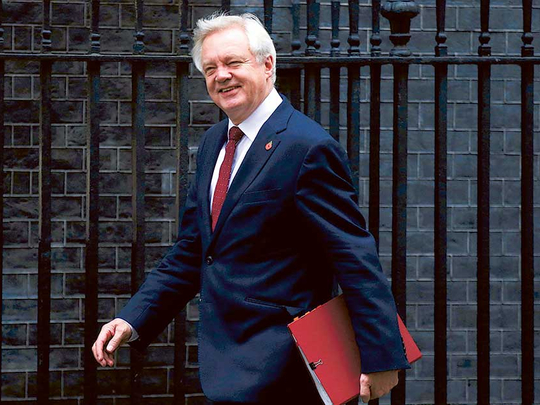
DUBAI: Whitehall is struggling to cope with the scale of work generated by the Brexit vote and the lack of a common strategy among cabinet ministers, according to a report about a leaked Cabinet Office memo.
The note found that departments are working on more than 500 projects related to leaving the EU and may need to hire an extra 30,000 civil servants to deal with the additional burden of work.
It identified a tendency by Theresa May to “draw in decisions and settle matters herself” as a strategy that cannot be sustained, and highlighted a split between the three Brexit ministers — Liam Fox, Boris Johnson and David Davis — and the chancellor, Philip Hammond, and his ally Greg Clark, the business secretary.
The note, leaked to the Times and said to be dated 7 November, also claimed that “no common strategy has emerged” on Brexit between departments despite extended debate among the permanent secretaries who head Whitehall departments.
In addition, it said major players in industry are expected to “point a gun to the government’s head” to get what they want after the carmaker Nissan was given assurances that it would not lose out from investing in Britain after Brexit.
A government spokesman denied the existence of an official memo, which the Times said had been drafted by an outside consultant.
The spokesman said: “This is not a government report and we don’t recognise the claims made in it. We are focused on getting on with the job of delivering Brexit and making a success of it.”
It is understood not to have been seen by ministers or commissioned as an official report by the Cabinet Office.
The note appears to be one of a number of recent leaks from the heart of government discussing dissent among senior figures about how May should approach Brexit.
The prime minister has promised to start the process of leaving the EU by the end of March next year but declined to reveal details of her approach, beyond saying there must be a bespoke deal to allow immigration controls as well as maintaining access to the single market.
In a major foreign policy speech at the annual Lord Mayor’s Banquet in London, May said “change is in the air” and “it’s the job of politicians to respond,” noting that Britain’s vote to leave the European Union and the election of Donald Trump have transformed the world.
She said Britain would champion free trade while managing “the forces of globalisation so that they work for all”.
The speech comes as the British government tries to build bridges with a US president-elect whose victory has surprised — and even alarmed — many European politicians.
British Foreign Secretary Boris Johnson said on Monday that it’s “very important not to prejudge the president-elect or his administration.” And May’s spokeswoman, Helen Bower, said Downing St. wants “an effective, strong working relationship” with the incoming US president.
May and Trump spoke by phone on Thursday, the day after Trump’s victory was announced. But the call has been overshadowed in Britain by Trump’s meeting on Saturday with UK Independence Party leader Nigel Farage, a key player in the UK’s decision to leave the European Union.
Ukip issued a gleeful press release accompanied by a picture of the two men, beaming side by side in front of a golden elevator at Trump Tower in New York.
May firmly rejected suggestions that she should use Farage — a political foe of her Conservative party — as a go-between with Trump’s team.
Bower said that Trump told May “he looked forward to enjoying the same close relationship that (Ronald) Reagan and (Margaret) Thatcher did”.
“I don’t remember there being a third person in that relationship,” Bower noted.
May, who took office when David Cameron resigned after losing the June referendum on EU membership, has stressed the need to help those who feel left behind by the economic and social changes of recent decades.
Years of recession and economic uncertainty since the 2008 global financial crisis have helped fuel resentments that drove the votes for Trump and Brexit.
May told a black-tie dinner at London’s medieval Guildhall: “We meet in a world transformed.”
She said liberalisation and globalisation are forces for good, and “free markets and tree trade” are the best way to lift people out of poverty.
But — in a nod to the anti-establishment feeling that fuelled Trump’s victory and the Brexit vote — she added that governments must help people who have seen “their jobs being outsourced and wages undercut”.
“To be the true global champion of free trade in this new modern world, we also need to do something to help those families and communities who can actually lose out from it,” May said.












